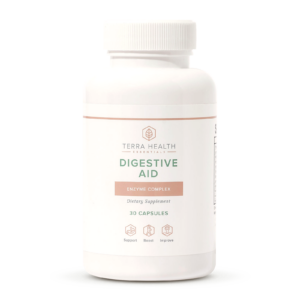ttheypNo-one wants to have a gassy tummy; it’s painful, inconvenient, and downright embarrassing at the best of times. The key to managing your gas and stop feeling bloated is to figure out what’s causing it in the first place. In fact, some simple lifestyle changes can make a massive difference to just how often you suffer from gas. And if you manage to maintain these new lifestyle habits, you may even eradicate this issue completely!
Why You’re So Bloated
Passing gas is a normal part of your digestive functioning. Any carbohydrates that aren’t broken down in your stomach and small intestine will end up in your large intestine completely intact and create discomfort. If excess gas is created behind the stool it will further amplify the bloating. When these foods aren’t processed gas is produced as a result.
There are a number of things that cause gas and bloating but one of the most common culprits is overindulgence. If you ask for seconds and thirds at the dinner table, you’re setting yourself up for a dodgy tum later and you know it. Another thing to watch out for is a food intolerance; you may react badly to gluten or dairy without even realizing it, and simply removing these foods from your diet can have a significant impact on your health if this is the case!
Other high-fiber foods such as green veg and beets can cause bloating due to the fact that they’re hard to digest, and even just eating too fast can cause you to swallow air and become gassy! You may also have an underlying problem that stops gas from moving through your system in a regular manner, which can lead to painful stomach spasms and distention during the digestive process.
However, there are a number of ways to keep the gas at bay and minimize bloating.
 Slowly Sip on Water Throughout the Day
Slowly Sip on Water Throughout the Day
Everyone knows that water is good for you in all kinds of ways, but it can specifically help your system to digest gassy foods as quickly as possible. This stops your intestines from contracting too much and for too long, which is what can make you feel bloated and full of gas.
Stop Swallowing So Much Air
Chewing gum is one of the main culprits here, but you should also avoid things like taking huge gulps of water at once (see point no.1 about “sipping”!), drinking too many carbonated drinks, eating too quickly, and talking whilst eating.
 Get Tested for Food Allergies/Intolerances
Get Tested for Food Allergies/Intolerances
In many cases of bloating, a food sensitivity is to blame, and two of the main culprits are lactose and gluten. Track what you eat each day and examine the timelines. Do they match up in terms your symptom onset?
Many people can go for years without having any issues with lactose, but we produce less of the important lactase enzyme as we age and this makes it harder for your body to break down many dairy products. If you feel you may have lactose intolerance, try adding digestive enzmyes to your diet to ease your symptoms. If this doesn’t work, you may have to cut it out completely, but this extra supplementation often gives your digestive system the helping hand it needs.
 Combat Cramping with Peppermint Tea
Combat Cramping with Peppermint Tea
Peppermint is a natural spasmodic which means it can prevent your intestines from spasming too much and producing extra gas. If you don’t fancy a cup of peppermint tea, you can always try the capsule form instead. Although usually recommended for IBS sufferers, peppermint can help anyone who suffers from bloating by relaxing your intestinal muscles so that stools and gas and pass through easily. Note: if you suffer from heartburn, peppermint may not be the best option as it can exacerbate your symptoms.
Buy a Heating Pad
The warmth of a heating pad can really do the trick when you’re full of gas. In a similar mechanism to peppermint, the warmth of the pad can relax your intestines and stop them from contracting too much. This often helps to alleviate the stomach ache you get from extra gas.
 Stay Active
Stay Active
Exercise is clearly good for your health, but it can also help to alleviate bloating and gas. You don’t have to start jogging 5k every morning at 6am, but even a short quick walk or some gentle stretches can really help to ease the pain of trapped gas.
Supplement with Probiotics
Probiotics are bacteria but they’re GOOD bacteria. Supplementing with a good probiotic can help to regulate the bacterial balance in your colon to prevent bloating, in addition to other benefits such as boosting your immune system.
 A Tummy Massage Can Work Wonders!
A Tummy Massage Can Work Wonders!
A tummy massage can be a great way to get your bowels to spur into action. To do this correctly, place your hands just over your right hip bone and rub upwards in a circular motion towards the right of your ribs. Then rub across your tummy to the left side of your rib cage and downwards to your left hip bone. It doesn’t work 100% of the time but it’s definitely worth a try!
Monitor Your Fiber Intake
Fiber is an important component of a healthy diet as it bulks up your stools to prevent constipation. However, when you have too much fiber (generally over 70g a day) you can get super gassy because the bacteria in your colon is working in overdrive to break it down. Keep a food diary to identify the foods that cause you to bloat and if possible either eliminate or minimize your intake of these foods.
Once you figure out what’s causing your bloating in the first place and follow these steps to manage it, you’ll be one step closer to getting it under control!
 Get a Headstart With Our Digestive Aid Supplement
Get a Headstart With Our Digestive Aid Supplement
Regardless of what’s causing your gas and bloating, our Digestive Aid will help. AND we have a special 30% discount just for readers of our blog! To avail of your 30% off, just use the code gasreliefsolutions30 when placing your order.
Don’t forget to follow us on Facebook where you can contact us anytime with questions or a customized treatment plan!

